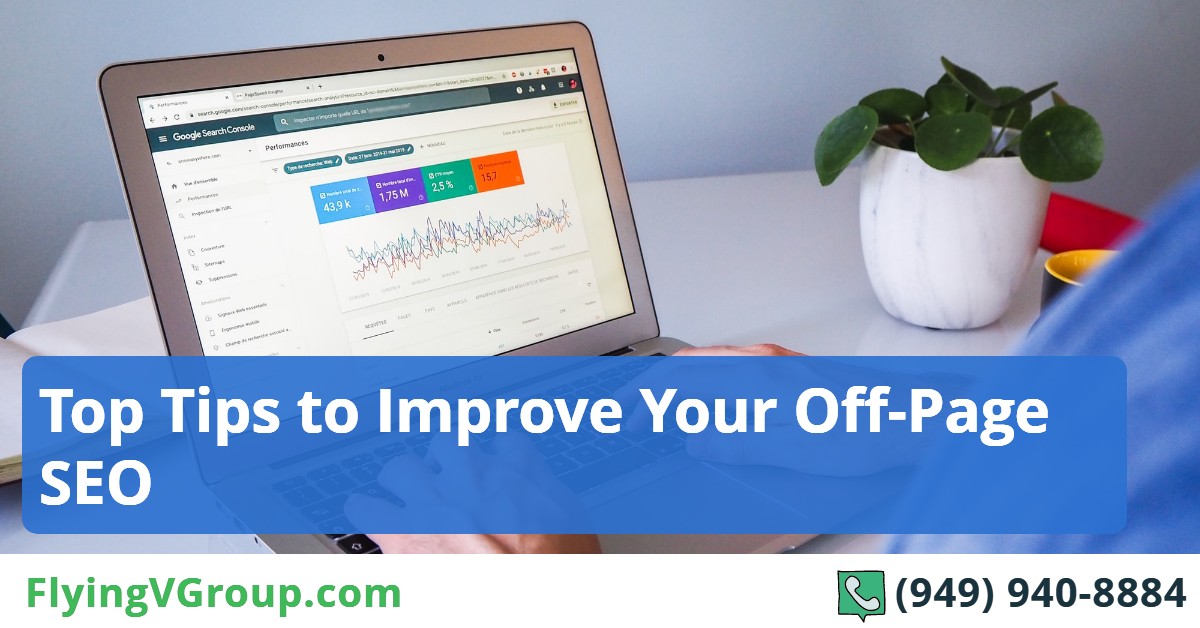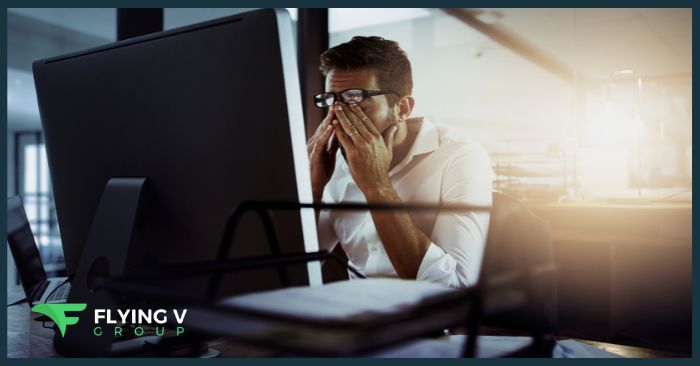There are many factors involved in building a strong SEO presence for your website. One of the most important elements is your off-page SEO, including backlinks. This is essential for search engine rankings and should form a key part of your digital marketing strategy. In this article, we’ll be sharing our top tips to improve your off-page SEO:
- 1. Is Off-Page or On-Page SEO More Important?
- 2. Why Does Off-Page SEO Matter?
- 3. What’s Link Building and How Does it Help?
- 4. Why is Content Important?
- 5. Can Blogging Boost Your Off-Page SEO?
- 6. What is the Role of Social Media Marketing?
- 7. The Importance of Patience
- 8. Writing Guest Blog Posts
- 9. Social Bookmarking
- 10. Get Heard on a Podcast
1. Is Off-Page or On-Page SEO More Important?
Your off-page SEO regulates how effectively your website ranks on search engine results pages (SERPs). Compared to on-page SEO, you have much less control over off-page SEO, as it needs other people to acknowledge and link back to your website. This makes off-page SEO a much better signal of the value your website provides to your customers and visitors.
2. Why Does Off-Page SEO Matter?
Off-page SEO matters because it sends a strong message to search engines that the content on your website is important to others. This is reinforced by every link back to your site that is created. If two websites have a similar on-page SEO score, the number of external sources verifying the quality will act as a tiebreaker to let search engines know which one to rank first.
3. What’s Link Building and How Does it Help?
One of the most straightforward ways to optimize your off-page SEO is through backlinking. This is a strategy that helps to generate authentic links back to your website. The more reputable the site that backlinks to you, the better it is for your SEO.
There are two key benefits to being recognized by an established website through a backlink. First, a solid backlink will direct more traffic to your website. Second, it tells Google and other search engines that your content is quality, improving your page rank. This is because links are the main way that the internet is navigated, and they guide users to more relevant information.
There are a few simple ways to create more backlinks from external websites. You could join an association, like your local Chamber of Commerce, and create a link on your profile. Writing good quality blog posts, infographics and videos is another great way to encourage clicks and build natural links directing to your website. You might also think about reaching out to other bloggers or journalists to offer guest posts or asking them to host something that you’ve built. For this, you can hire an agency to help you conduct blogger outreach services.
As part of your strategy, you should also share content on social media to help it generate traction and optimize your posts, by using hashtags and keywords, to help posts get discovered more easily.
You should check your backlinks regularly to make sure that your off-page SEO strategies are working the way you want them to. There are lots of tools that you can use to analyze this, including Moz Link Explorer, SEMrush, Buzzsumo, and Ubersuggest.
Knowing why you’re creating your links will help when implementing your off-page SEO strategy and digital advertising. It will all work together to create a significant presence and help you reach your target audience.
4. Why is Content Important?
“Your off-page techniques can be world-class, but if your content isn’t good quality, it won’t mean a thing,” explains Denise Wolf, a SEO blogger at Writinity and Researchpapersuk. “Your content is the thing that will keep your customers on your website. If the article isn’t useful or interesting, they’re not going to stay there for long, and might not come back.”
You could have thousands of links sending traffic to your website, but those users won’t convert into paying customers if your content isn’t useful or valuable to them. Quality content is how you show your audience that you’re expert with the answers to their questions. Good content will catch users as soon as they arrive on your website.
5. Can Blogging Boost Your Off-Page SEO?
We highly recommend blogging as a way to create linkable content for your brand. It’s an easy way to create a consistent flow of long-form content on your site. You can find our ten top tips for optimizing your blog content here.
If you make comments live, your readers can add their thoughts and share your content straight from the blog. This will make your content much more discoverable and you’ll start to generate links and brand mentions naturally. It will also help you to stand out as a thought leader in your industry: your audience will start to visit your site first for the answers to their questions and to keep up to date with recent trends and news.
6. What is the Role of Social Media Marketing?
Social media marketing won’t impact your SEO ranking directly, but it can be a great way to build brand awareness. If your business has a strong social media presence, it will feel more approachable and trustworthy. This is becoming more and more important today for brands.
Trust is important in building a brand. It’s hard for customers to trust you if you’re not easily approachable or if there isn’t much information available about you. Staying active on social media will help your visitors to get to know your brand. Share blog posts that are relevant and easy to read and remember to respond to comments on your social media pages and blog in a positive way. This reminds your audience that your business is run by a person rather than a computer.
7. The Importance of Patience
An easy mistake content creators make is putting too much focus on building their off-page SEO. Instead, your goal should be to improve the website’s ranking so that your audience can find you, get in touch, and buy your products and services. What you are trying to achieve is a positive engagement with your target audience, which will lead to links, brand mentions, social media comments and reviews. It’s a balancing act. If your campaign isn’t going the way you expect, have patience and don’t be tempted by blackhat SEO methods.
“There is no quicker way to damage your brand’s reputation and your SEO ranking than by using black-hat SEO methods,” says Jackson Tanner, a marketing expert at Draft beyond and Last minute writing. “This can include techniques like paying employees to write positive reviews or purchasing links to your website.”
Because you can’t influence off-page SEO the way that you can control on-page factors, you’ll often end up playing a frustrating waiting game with your audience. You will find yourself watching, waiting, and hoping for positive responses.
If you do get a negative response, it’s time to re-think your SEO strategy and find out what works and what needs fixing. You can improve your chances of getting positive feedback by reaching out to your existing clients and asking them to review your products. This’ll help to improve product pages and encourage others to buy. You can also consider reaching out to influencers and well-known figures to see if they’ll endorse your products and boost the trust of your audience.
8. Writing Guest Blog Posts
Creating content and writing guest articles for third-party websites and publications is a fantastic way to build expert authority in your industry and to promote your business via backlinks. It can give you free publicity to bring new customers and visitors to your website who might never have heard of you otherwise. You’ll also start to build a portfolio of posts and case studies you can show to other website owners and publications.
9. Social Bookmarking
Many platforms like Reddit, Tumblr and StumbleUpon let you submit blogs and content. This is called social bookmarking.
On these websites, content is divided into specific niches, which helps you to attract customers in the demographics that you are targeting in your marketing. Be sure to follow the rules of each individual site and know your audience before submitting content, though. Sites like Reddit are designed with community and engagement in mind. If you try to spam content or excessively self promote, you can get banned or even blacklisted. As always, be sure to add value to the customer experience.
10. Get Heard on a Podcast
Podcasts are a marketing platform on the rise and an underrated off-page SEO strategy. According to a report by Edison Research, three-quarters of the US population either listen to podcasts or are familiar with them. That same report said that 24% of the population had listened to a podcast in just the past week.
A guest spot on a podcast is a great way to build backlinks. For many people, it’s easier to have a live conversation about a topic than writing a post. Reach out to popular podcasts about collaboration opporuntiies: you have the potential to get high quality backlnks to your website and your content.
Thank you so much for reading Top Tips To Improve Your Off-Page SEO. We really appreciate it! If you have any questions about our article, or can suggest any other topics you think we should explore, feel free to let us know.
Be sure to sign-up for our newsletter to receive monthly emails on all of the latest trends and happenings in the digital marketing space. You will also receive our FREE E-Book with the Amazing Marketing Tools for Powerful Business Growth. Sign-up below!
Also, if you received some value out of this article, please share with your friends or colleagues, or leave a comment/question below. We really appreciate you reading our blog and every share/comment means the world to us and allows us to continue producing valuable tools to help you grow your business!






0 Comments